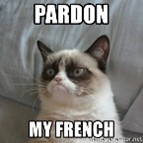Are you about to use profanity to emphasize your speech? If so, you could give the listener a warning of what's to come by using the saying, "pardon my French." This post unpacks the meaning and origin of this expression.
Meaning
The expression "pardon my French" has several uses in the English language. It serves as a precursor to you using profanity in a conversation. For example, you could say, "pardon my French, but that guy is a real (insert cuss word here)."
You could also use the phrase after you speak a cuss word as a means of asking for forgiveness for your use of bad language. "Pardon my French. I don't realize children were present." Typically, you'll be using the expression in situations where you're trying to be polite. Or when you don't want to bother people privy to the conversation to think less of you for your profane vocabulary.
In rare circumstances, you'll be using it as a genuine apology for speaking out of tone. However, whether you're using it in the former or later, it's a way of apologizing for your language. The phrase suits use in social and professional situations, especially when trying to make a point about someone or something.
Example Usage
"You know, that guy over there is a real idiot. Pardon my French, but he's got to be the biggest a**hole I've ever met."
"Pardon my French Claire, I didn't see your kid was sitting right there; that was bad form on my part."
"I know I shouldn't have gone crazy like that; you'll have to pardon my French; I'm feeling frustrated right now."
"Dear me, pardon my French, but I just had to get that out there."


Origin
The origin of the saying, "pardon my French," comes from the 19th century. It's no secret that the British and French have a lasting feud between the nations going back hundreds of years. The British would see the French as a vulgar nation.
The definition of the saying "pardon my French" comes from The Lady's Magazine, published in 1830.
"Bless me, how fat you are grown! – absolutely as round as a ball: – you will soon be as embonpoint, excuse my French, as your poor dear father, the major."
However, during the 1950s and 60s, the use of the phrase changed to describe a precursor to saying foul language or as an apology in the wake of using profanity. The saying would frequently appear in TV shows and radio programs, absorbing American culture.
Phrases Similar to Pardon my French
- Excuse my language.
- Sorry for the outburst.
- Apologies for cussing.
Phrases Opposite to Pardon my French
- I don't care what you think.
- I'll swear if I want to.
What is the Correct Saying?
- Pardon my French.
Ways People May Say Pardon my French Incorrectly
The saying has nothing to do with French or speaking the language. The "French" in the saying is profane language, such as swear words. Therefore, using the expression to describe anything other than foul language is the incorrect use of the phrase.
Acceptable Ways to Phrase Pardon my French
You can use the saying "pardon my French" when you're apologizing for using foul language. Some people may use the expression after they swear, or they may say the phrase and then follow up with a vulgar statement or swear word. The term suits social and professional use, and it's a way of telling someone that you're aware the language is bad, but the situation calls for extreme profanity because of the news.